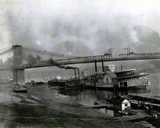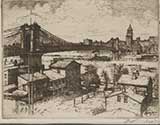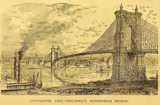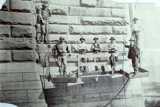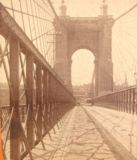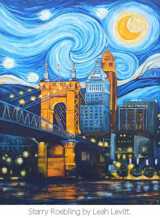Officially the John A. Roebling Suspension Bridge, and usually just called the Roebling Bridge, or the Suspension Bridge, John Roebling called it simply

 |
 |
 |
| c. 1900 | Toward Cincinnati | 1896 |
 |
 |
 |
|
| Construction Views, June, 1866. We assume the three images on the left are all the same picture, cropped to different effects. |
|||
| “In 7 days, the Scott street ferry-boats crossed the river 1,480 times, carrying 29,311 passengers over 12 years [of age], 369 horses, 382 cattle, 1,566 drays, 627 buggies, and 450 other 1-horse vehicles, 74 two-horse carriages, 230 omnibuses, 341 other two-horse vehicles, 32 3-horse and 178 4-horse vehicles. This information was obtained as data for the probable business of the proposed bridge from Covington to Cincinnati.” The History of Kentucky, by the Late Lewis Collins |
The souvenir booklet from when the bridge opened in 1867 (pdf).
Scene of the 1896 bridge re-building. The murky air may be fog, but more likely pollution - they burned lots of coal in those days.
from a Facebook post by David Rutherford
A sketch by E. T. Hurley, 1917
| The Roebling Bridge, taken from a booklet the Southern Railway issued to promote their railroad when it opened. You can read the Northern Kentucky portion of the booklet here (pdf). |
 |
 |
 |
| Looking toward Ohio | from Collins' History of Kentucky | 1944, High Water From a Facebook post by Linda Schilling Mitchell |
 |
 |
 |
| An 1868 sketch of the Suspension Bridge |
c. 1870's | c. 1870's |
They spotted a sea serpent from the bridge in 1878.
 |
 |
 |
| In the flood of 1884 | 1884 on the Ohio side | |
 |
 |
 |
 |
The Great Wire Bridge |
19th century | An early painting of the bridge. |
The Toll Gate for Pedestrians, from Harpers New Monthly, 1883 |
| In 1869, with their city on the verge of building a bridge modeled after the one in Cincinnati, The Brooklyn Eagle sent reporters to Cincinnati to check it out. They also interviewed Amos Shinkle (“Does the bridge pay, Sir?” “Yes, Sir, very handsomely”). You can read their feature story here. |
 |
 |
| Suspension Bridge from the Newport Barracks | 1910. That's a Cadillac, and those folks are on a Glidden Tour (Wikipedia). Shout out to Kurt Hultquist for the ID |
![]()
Stone Masons on the Roebling Bridge,
From a Facebook post by
Roebling Suspension Bridge History and Heritage
| “When we look upon the massy stone piers of the Cincinnati and Covington Suspension Bridge, and see the workman busily engaged in dressing the huge rocks, and placing them in position where they are to remain visible to the mortal eye through all the mutations of time - century after century – we cannot but feel that over the minds of the workmen there comes now and then a sweep of lofty thoughts concerning the grandeur and long-enduring character of the work on which they are thus engaged. As a handsomely dressed rock is placed into position, we can imagine the thoughtful mason to soliloquize thus: These outer rocks which occupy so prominent a position will be gazed upon by the children of my great-great-grandchildren. All my posterity to the latest generations will have it for their boast that an ancestor of theirs helped build this great and wonderful work. I am leaving marks of my life’s doings while in the world and I am not ashamed of the record which day to day I am making up. I feel a glorious consciousness within me – that I have lived for some purpose – that I have not lived in vain.” From the Saturday Evening American, (Covington), August 27, 1864 |
 |
 |
 |
| c. 1934 | One of the walkways | That's the steamer Eureka. Note the river height. |
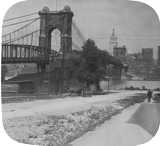 |
 |
 |
|
| From a Facebook post by Cincinnati and Soup | From a Facebook post by John Counette |
 |
 |
 |
| With a separate toll booth for pedestrians. | Under Construction | the 1937 flood |
![]()
 |
 |
 |
 |
 |
|
| The Great Bridge, c. 1880-90, All of these are old stereoview cards and, with the ones below, and are indicative of the bridge's fame, and importance as a tourist attraction in the late 1800's. | |||||
 |
 |
 |
||
Front and back of an old stereoview card |
More old stereoviews
|
|||
| A close up of the Suspension Bridge |
Note the flooring of the bridge, originally made of wood. |
More old stereoviews
|
||
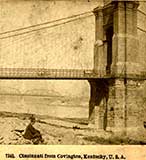 |
|||
| Drawing, c. 1880's | c.. 1880's | ||
 |
 |
 |
 |
|
| 1890 Flood, 56.9 Feet | In the 1884 Flood | These stereoview cards are from the late 1800's | ||
![]()
A film to celebrate the 150th Anniversary of the Roebling Bridge, produced by the Kenton County Public Library is at this site.
 |
 |
 |
 |
| All Pre-WWI | |||
 |
 |
| c. 1906 | 1908 |
 |
 |
 |
| 1898 | 1912 | c. 1910 |
| The most common of all Covington postcards is a variation of the above two shots of the Suspension Bridge | ||
A painting by Lea Levitt
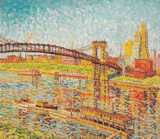 |
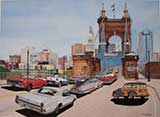 |
| Spanning the Ohio, a painting by Julie Morrow DeForest, c. 1930 |
A 2014 painting by D. McCrary |
 |
 |
|
| “Jamming Barges Under the Suspension Bridge”a painting by H. H. Wessel, 1921 | Background on Wessell and his painting. from the January, 1922 Cooperative Engineer. |
 |
|||
| John Stobart (Wikipedia) a contemporary painter of old time riverfronts, has included the Suspension Bridge in a number of his works. His online gallery is here. | A painting by Milton O'Dell (external link) | ||
 |
 |
| Crossing | Suspension Bridge, circa 1903 |
You're on the Ohio side, at what was then the foot of Vine Street in the flood of 1913
 |
 |
 |
 |
| Suspension Bridge and Covington Riverfront |
Suspension Bridge and Covington Riverfront November 16, 1927 |
unknown year | 1928 |
 |
 |
 |
| c. 1949 | c. 1949 | 1944 from a Facebook post by Linda Schilling Mitchell |
![]()
Ten things you likely don't know about the Suspension Bridge are here.
![]()
Here's the application for the bridge to be on the National Register of Historic places, complete with photo's, history, and maps.
“The Covington and Newport street railroads carry 2,600 passengers per day over the Ohio river suspension bridge.”
from the Louisville Daily Journal, August 19, 1868
![]()
Technology, in 1869, brought to bear to prevent trotting across the bridge. Story here.
![]()
1937 Flood
From a Facebook post by Myles H. Kitchen
 |
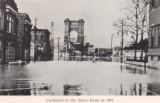 |
 |
| In the 1937 Flood notice the back up into the “Newport fill” on the left picture |
||
 |
 |
 |
|
| from a Cindy Alexander post on Facebook | |||
| It's true that you could cross the Suspension Bridge in the 1937 flood, but it's not like they didn't have to lend some assistance to get'er done. | |||
![]()
 |
 |
 |
| The Green Line Heads for Latonia, 1938. Note that the Suspension is a toll bridge |
c. 1935, from the Ohio side |
Looking south toward Covington, 1931 |
 |
| On the Covington side, looking toward
Cincinnati. Steamers on the Ohio side are the America, the Magnolia, and the Major Anderson |
 |
 |
 |
|
| from the Ohio side, c. 1910 |
Note the huge number of steamers at the Cincinnati landing |
The
Ben Franklin on the Covington shore |
The
Indiana passes under the Suspension Bridge |
|
|
|
| An early 20th century view | A 19th century view. Note all the steamboats |
 |
 |
| The original plan was for a single tower in the center of the river. |
Suspension Bridge, 1934, from the US Army, Chief of Engineers |
![]()
A citizens group, the Covington-Cincinnati Suspension Bridge Committee, Inc. published this handy guide to the history of the Suspension Bridge. The two parts on the left are a history of the bridge; the two parts on the right are a walking tour. You can visit the Committee on the web here. |
|||
![]()
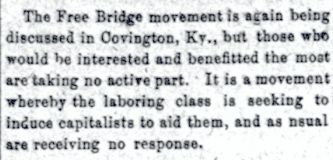
The Catholic Telegraph, August 19, 1880
| Remarks upon Mr. Roebling's plan & report for a wire suspension bridge, proposed to be erected over the Ohio River, at Cincinnati, is online at this site. | |
| The Suspension Bridge was opened on Saturday, December 1, 1866. 46,000 people crossed. The next day was an unseasonably warm Sunday, and it's estimated that 120,000 people came out. The formal dedication was the following New Year's Day. | |
| The Ticket, a Covington newspaper, cited an Ohio Law, which said that the Suspension Bridge must charge 15% less than ferries then operating, and published a comparison of rates to cross the Suspension bridge in 1876, and the comparable ferry rates from 1863. It's here. | |
| An article from Cincinnati Engineers from 1922 on the Suspension bridge is here. | |
| There are several plaques on the ends of the bridge. You can see close-ups of them, here. | John A. Roebling's bio on Wikipedia is here. |
| The original bridge was painted “Spanish Brown,” thought to
be a light brown corrupted by linseed oil to be a darker brown. From the 1895-1899 reconstruction to the mid-1930's it was black and white. From the 1930's to 1976 it was green, and since 1975, it's always been blue. |
|
| There was a plan to make the bridge a double-decker. | An 1819 author ponders a bridge across the Ohio. |
| The Enquirer's 1900 article on Ohio River bridges is here. |
The Covington-Cincinnati Suspension Bridge Committee's site
here.
They have lots more bridge pictures, and a nice history of the bridge. |
 |
 |
| Streetcar ticket, c. 1880's | |
![]()
 |
 |
| Whatever . . . | Last and least. What a mess. |
![]()



